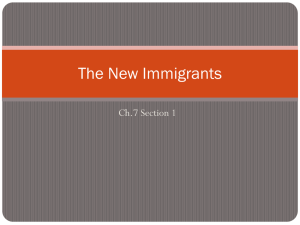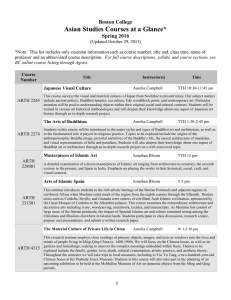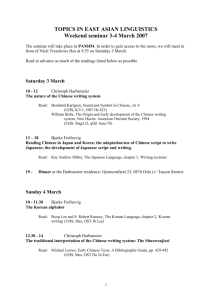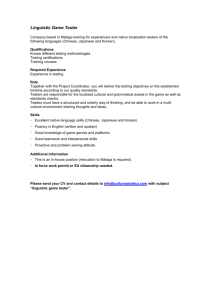Asian Studies Courses at a Glance* Boston College Fall 2016
advertisement
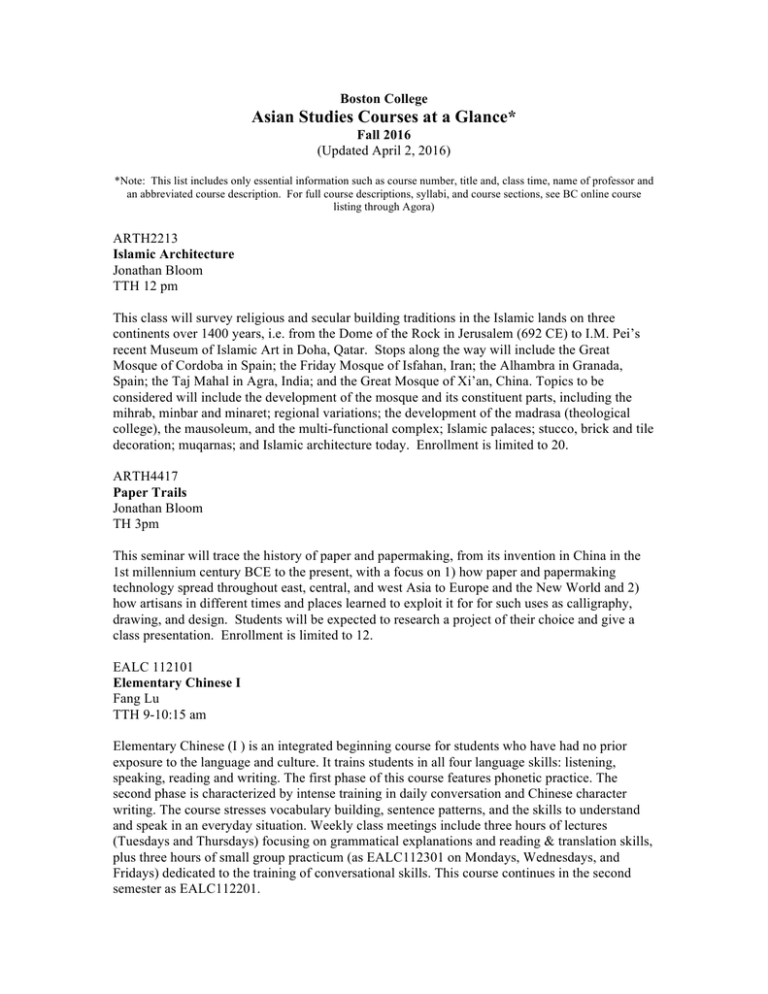
Boston College Asian Studies Courses at a Glance* Fall 2016 (Updated April 2, 2016) *Note: This list includes only essential information such as course number, title and, class time, name of professor and an abbreviated course description. For full course descriptions, syllabi, and course sections, see BC online course listing through Agora) ARTH2213 Islamic Architecture Jonathan Bloom TTH 12 pm This class will survey religious and secular building traditions in the Islamic lands on three continents over 1400 years, i.e. from the Dome of the Rock in Jerusalem (692 CE) to I.M. Pei’s recent Museum of Islamic Art in Doha, Qatar. Stops along the way will include the Great Mosque of Cordoba in Spain; the Friday Mosque of Isfahan, Iran; the Alhambra in Granada, Spain; the Taj Mahal in Agra, India; and the Great Mosque of Xi’an, China. Topics to be considered will include the development of the mosque and its constituent parts, including the mihrab, minbar and minaret; regional variations; the development of the madrasa (theological college), the mausoleum, and the multi-functional complex; Islamic palaces; stucco, brick and tile decoration; muqarnas; and Islamic architecture today. Enrollment is limited to 20. ARTH4417 Paper Trails Jonathan Bloom TH 3pm This seminar will trace the history of paper and papermaking, from its invention in China in the 1st millennium century BCE to the present, with a focus on 1) how paper and papermaking technology spread throughout east, central, and west Asia to Europe and the New World and 2) how artisans in different times and places learned to exploit it for for such uses as calligraphy, drawing, and design. Students will be expected to research a project of their choice and give a class presentation. Enrollment is limited to 12. EALC 112101 Elementary Chinese I Fang Lu TTH 9-10:15 am Elementary Chinese (I ) is an integrated beginning course for students who have had no prior exposure to the language and culture. It trains students in all four language skills: listening, speaking, reading and writing. The first phase of this course features phonetic practice. The second phase is characterized by intense training in daily conversation and Chinese character writing. The course stresses vocabulary building, sentence patterns, and the skills to understand and speak in an everyday situation. Weekly class meetings include three hours of lectures (Tuesdays and Thursdays) focusing on grammatical explanations and reading & translation skills, plus three hours of small group practicum (as EALC112301 on Mondays, Wednesdays, and Fridays) dedicated to the training of conversational skills. This course continues in the second semester as EALC112201. EALC 122101 Elementary Japanese I Ritsuko Sullivan MWF 12:00 W 11:00 This is a beginning Japanese course for the students who have never studied Japanese before. Basic writing characters of Hiragana, Katakana and some Kanji will be covered. The focus is on cultural aspects and four language skills. EALC 1311 Introduction to Korean I Choong-Nam Yoon TTH 1:15 - 2:45 pm This course is introduction to the study of the Korean language. The primary objective of this course is to develop the four fundamental skills of reading, writing, speaking, and listening comprehension. Classroom exercises focus on pronunciation, grammar, reading and speaking. Special emphasis is on the expansion of vocabulary by the students. Some basic Chinese characters will be introduced for clear meaning of the words. EALC 2121 Intermediate Chinese I Sing-chen Chiang TTH 9-10:15 am EALC 2123 Intermediate Chinese Practicum Te Lai; Xiaoqing Yu MWF 8-8:50 am/MWF 9-9:50 am This course is the practicum of Intermediate Chinese designed for students who have completed Intermediate Chinese I at Boston College or the equivalent elsewhere. The course introduces students to more complex grammatical structures, trains them in conversing about daily activities in a more extended way, as well as writing scripts for stage performance. EALC 222102 Intermediate Japanese I Ritsuko Sullivan TTH 12 - 1:15 pm This is a second year Japanese course. The goal of this course is for students to acquire a balanced competence in the four language skills. Mastery of this course will allow students to reach the N4 level of the (international) Japanese Language Proficiency Test. EALC 231 Continuing Korean I Choong-Nam Yoon TTH 12- 1:15 pm This course is for those who have completed elementary Korean (EALC1311 and EALC1312) or have basic skills in spoken and written Korean. The primary objective of this course is to develop intermediate level fluency in speaking, reading, and writing Korean. Special emphasis is placed on the expansion of vocabulary by learning more Chinese characters (hanja). In addition, students will be exposed to everyday life contexts (language, culture, etc.) likely to be encountered in contemporary Korean society. EALC 3166 Classical Chinese Literature Sing-Chen Chiang TTH 9-10:15 am This course introduces the history of classical Chinese literature from the earliest times to the end of the imperial period in 1911. We will read English translations of major literary classics such as Book of Songs, “Encountering Sorrow,” Zhuangzi, Daodejing, Records of History, early and medieval records of anomalies, Tang dynasty poetry and short stories, Song dynasty song lyrics, Yuan drama, and Ming-Qing novels. Special emphasis will be placed on acquiring analytical skills and critical perspectives in literary criticism through close reading of texts. The philosophical, religious, and historical contexts will also be introduced. Taught in English; no prerequisite. EALC 412101 & 412102 Advanced Chinese Fang Lu TTH 10:30-11:45 am (Lyon) & 12-1:15 pm (Stokes) Prerequisite: EALC 2122 or equivalent. This course is a continuation of the Intermediate Chinese and aims at further developing students' ability to use Chinese in a more advanced way. The priority of the course is given to in-depth reading of authentic writings in Chinese, with an emphasis on accurate comprehension, expansion of vocabulary for expressing more refined and sophisticated ideas, and development of ability to process sentences with complex structures used mainly in formal speech and writing. In addition, the course provides an introduction to important aspects of Chinese culture and society. ENGL 4373 Korean Cinema Christina Klein MWF 1-1:50 pm; T 7-9 pm (Required film screening) South Korea today is home to one of the most vibrant film industries in the world. This course introduces students to a broad range of Korean films made between the 1950s and the present. Some of these films were made as popular entertainments, others as cerebral works of art, and still others refuse any simple categorization. As we watch these films we will explore Korean history and culture, think about Korean cinema’s relationship to Hollywood and European cinematic traditions, and grapple with questions of genre and auteurism. HIST 204401 Chinese Environmental History Ling Zhang MWF 11-11:50 am Environmental degradation in contemporary China has attracted widespread attention. To understand China's environmental dilemmas, this course investigates key topics in Chinese environmental history over the last two millennia. The course begins with a broad survey of environmental problems in contemporary China. It then explores Chinese ideas and thoughts about the relationship between nature and human beings. It finally journeys back to pre-modern China to look at the historical roots of many environmental problems. The course focuses on several regional cases, and examines how different parts of China developed different relations with their environments and different strategies in dealing with them. HIST 204501 A Material and Cultural History of Food in China Ling Zhang MWF 2-2:50 pm This course studies historical continuity and changes of dietary traditions and culinary practices in China. We will examine how certain foods gave possibilities to and conditioned China's cultural formation and, in return, how food and ways of eating are culturally, socially, and politically constructed. The course's themes include food and religion in early China, food and Chinese medicine in the early medieval, food exchanges with central Asia, food and urbanization during the "Medieval Economic Revolution," the New World food in late imperial China, regional culinary and cultural diversities, and eating in globalized, modern China. HIST 400501 The Asia Pacific War Yajun Mo & Franziska Seraphim TTH 12 pm Co-taught by a Japanese and Chinese historian, this course explores the Second World War in Asia from multiple historical and historiographical perspectives. The term "Asia-Pacific War" explicitly links the conflict between Japan and the United States known as the Pacific War (194145) to Japan's expansionist ventures in Korea, Taiwan, the Chinese mainland, and Southeast Asia, and considers the cultural and intellectual dimensions of the war (and the way it is remembered) along with the political and military ones. HIST 407601 Tian'anmen Movement Yajun Mo TTH 9- 10:15 am This course explores the Tiananmen Movement as event, experience, and memory. It engages students to examine the rapid and often destabilizing shifts in China since the late 1970s - a period conventionally referred to as "the reform era." Using a variety of readings on the movement (including memoirs, official documents, propaganda, media coverage, and cultural productions in music and art), we will trace the effects of China?s earlier experiment with revolutionary socialism on the market-driven present, attending to ways in which the past shapes and haunts the contemporary situation. LING335801 The Linguistic Structure of Japanese Margaret Thomas TTH 1:30 pm A linguistic outline of the Japanese language. The phonological and writing systems of Japanese and their origins, Japanese morphology, fundamentals of Japanese syntax, and characteristics of Japanese vocabulary. PHIL447601 Classical Chinese Philosophy Fr. Joseph You Guo Jiang, S. J. TTH 1:30-2:45 am This course is an introduction to Classical Chinese Philosophy and designed to introduce students to the major philosophical schools of classical China, including the Confucian, Mohist, Daoist, and Buddhist schools. Through lectures, discussions, and reading of select primary and secondary sources, we will explore the formulations and subsequent transformations of key beliefs, doctrines, practices, and institutions that characterized specific cultural, educational, spiritual and philosophical traditions. POLI 246901 Politics of Japan and Korea Kenji Hayao MWF 11 am This course provides an overview to the politics of contemporary Japan and the Republic of Korea (South Korea). While most of the focus will mostly be on domestic politics, it will include some discussion of their respective foreign policies. The course begins with a brief historical account, and it then proceeds to discussions of culture and society, electoral politics, decisionmaking structures and processes, and public policy issues. POLI 4590 East Asian Security Robert Ross TTH 1:30-2:45 pm This class focuses on the strategic conditions of post-Cold War East Asia. It examines the regional political structure, the strategic characteristics of the region’s great power relationship – U.S.-China relations – and the implications for the conflicts on the Korean peninsula, in the Taiwan Strait, and in the South China Sea, and the role of alliance relationships in regional diplomacy. From these different perspectives, it considers the sources of state behavior and prospects for regional stability. THEO 3001 Hinduism: Past and Present Catherine Cornille TTH 9 am One of the oldest, and one of the more complex religions, Hinduism continues to take on new and diverse expressions in the contemporary world. This course will focus on modern developments within Hinduism in light of its ancient history. It will deal with questions of the status of women, caste, mega-gurus, nationalism, and internationalization in relation to the traditional texts, teachings and practices of Hinduism. In so far as traditional texts and ritual practices continue to shape contemporary Hinduism, the study of these texts and teachings is as relevant today as it was in the past. But the course will also will also focus on important changes which have taken place in the past two centuries. THEO 4472, PHIL 4472, TMCE 4472 Buddhist Ethics John Makransky W 3-5:25 pm This course focuses on ethical principles and practices of Buddhism in India, Southeast Asia and Tibet, how those principles have been applied for individual and social transformation in premodern Asia and, in the modern period, how they are being applied to current social issues, such as social and economic inequality, environmental degradation, ethnic and religious tension, and violence. Students are encouraged to notice how their study of Buddhism informs their own ethical, philosophical, and theological understandings. Mindfulness practices, which involve learning to pay fuller attention to one’s inner and outer worlds, are introduced in class to inform our studies. Requirements: active class participation based on weekly writing, two graded homeworks, final paper. This is a rigorous course for strong students who have a strong interest in the subject. THEO/PHIL 6578 Daoism David Mozina TTH 9- 10:15 am *To Be Determined Daoism (sometimes spelled Taoism) has been imagined in the West as an Eastern philosophy of blithe individuality and environmental consciousness. But what have Daoist thought and practice meant to Chinese practitioners? The answer might surprise. This course will examine major moments of thought and practice from the early, medieval, and modern periods of China’s most successful indigenous religious tradition. Close readings of texts and images will challenge Western assumptions about what this religious tradition has been all about, and by extension, how we imagine the general categories “theology” and “religion.”
